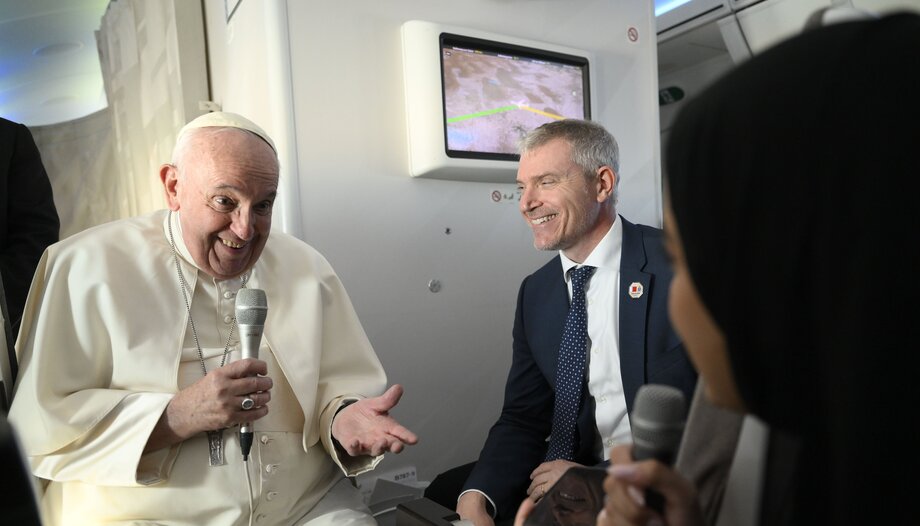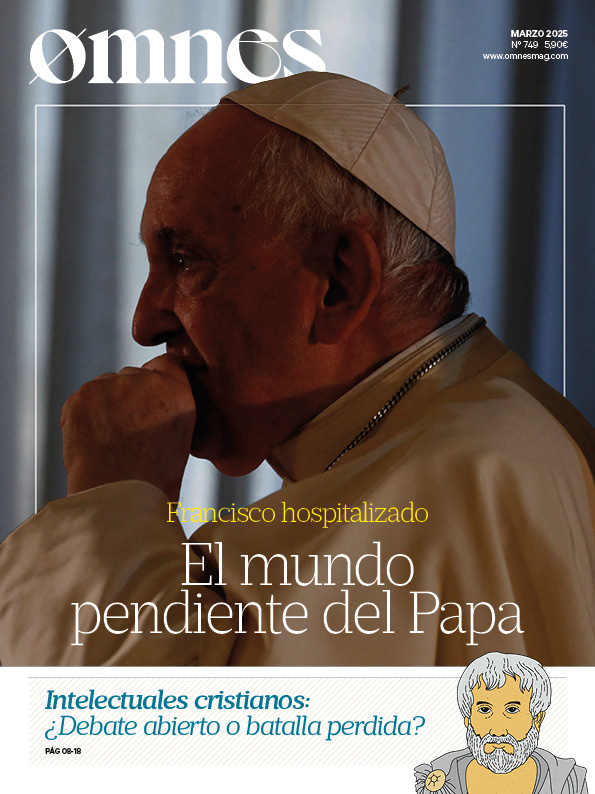"A trip of encounter because the objective was precisely to be in interreligious dialogue with Islam and ecumenical dialogue with Bartholomew. The ideas put forward by the great Imam of al Azhar were in the direction of seeking unity within Islam, respecting differences, and unity with Christians and other religions."
On his return flight from Bahrain, answering questions from journalists, Pope Francis took stock of the apostolic journey that concluded on Sunday, November 6.
A journey born of the Abu Dhabi Document, whose genesis Bergoglio reconstructs, recounting that at the end of an audience at the Vatican of the great imam of Al Azhar invited him to lunch "and sitting at the table we took the bread, broke it and gave it to each other". It was a fraternal lunch and at the end the idea of the Document of Human Brotherhood signed in 2019 was born. It was a God thing, which came out of a friendly lunch'.
The text, the Pontiff revealed, "was for me the basis of the Human Brotherhood. I believe that one cannot think of such a path without a special blessing from the Lord on this path".
We have already reported on the conclusions of the Forum on the dialogue with the leaders of the different confessions.
Let us now recall other highlights of the visit: the embrace of the Catholic community with the Mass presided by Francis at the National Stadium of Bahrain, the meeting with the young people at the Sacred Heart School and, finally, with the bishops, the local clergy, the consecrated, seminarians and pastoral agents.
"Faith is not a privilege but a gift to be shared."
At the entrance to the Cathedral of Our Lady of Arabia for the ecumenical meeting and prayer for peace, the Pope was welcomed by Bishop Paul Hinder, Apostolic Administrator of the Apostolic Vicariate of North Arabia. Here, in the presence of representatives of other Christian confessions, the Pontiff expressed his awareness that "what unites us far outweighs what separates us and that, the more we walk according to the Spirit, the more it will lead us to desire and, with God's help, to restore full unity among us."
Hence the invitation to bear witness. "Ours, in fact, is not so much a discourse of words, but a witness to be shown by deeds; faith is not a privilege to be claimed, but a gift to be shared". Finally, the "Christian distinctive, the essence of witness": to love everyone.
On the third day of the apostolic journey, Francis celebrated Mass in the morning at the Bahrain National Stadium. In the afternoon, he met with some 800 young people at Sacred Heart College, addressing three invitations to them: "not so much to teach you something, but to encourage you".
Embrace the culture of care," the Pope began, "first of all for yourselves: not so much for the exterior, but for the interior, for the most hidden and precious part of yourselves, for your soul, for your heart. The culture of care, therefore, as "an antidote to a world that is closed and permeated by individualism, prey to sadness, which generates indifference and loneliness".
Because if we do not learn to take care of what surrounds us - of others, of the city, of society, of creation - we end up spending our lives like those who run, work hard, do many things, but, in the end, remain sad and lonely because they have never fully tasted the joy of friendship and gratuitousness". The second invitation: sow fraternity and "you will be reapers of the future, because the world will only have a future in fraternity". Be close to everyone, without making differences because "words are not enough: we need concrete gestures carried out daily".
Finally, the last invitation, to make decisions in life. "As at a crossroads," he stressed, "you have to choose, get involved, take risks, decide. But this requires a good strategy: one cannot improvise, live only by instinct or only in an improvised way! But how can we train our 'capacity to choose', our creativity, our courage, our tenacity, how can we sharpen our interior gaze, learn to judge situations, to grasp the essential? In "silent prayer", trusting in the constant presence of God who "does not leave you alone, ready to lend you a hand when you ask him for it". He accompanies and guides us. Not with wonders and miracles, but by speaking gently through our thoughts and feelings".
"What is essential for the Christian is to know how to love like Christ."
In the morning, the Pope met with the Catholic community at the Mass for Peace and Justice at the Bahrain National Stadium. Some 30,000 people were present from the four countries of the Apostolic Vicariate of North Arabia - Bahrain, Kuwait, Qatar and Saudi Arabia - but also from other Gulf countries and other territories.
In his homily, Francis took a high note, inviting the faithful to reflect on Christ's strength: love, exhorting everyone to "love in his name, to love as he loved. And what Christ proposes "is not a sentimental and romantic love" - the Pope explained - but a concrete and realistic one because "he speaks explicitly of the wicked and the enemies". And peace cannot be restored - the Pontiff affirmed - if one bad word is answered with another even more bad word, if one slap is followed by another: no, "it is necessary to "deactivate", to break the chain of evil, to break the spiral of violence, to stop brooding resentment, to stop complaining and pitying". But love is not enough "if we limit it to the narrow sphere of those from whom we receive so much love".
The real challenge, in order to be children of the Father and build a world of brothers and sisters, is to learn to love everyone, even the enemy, and this "means bringing to earth the reflection of Heaven," he added, "it is to bring down upon the world the gaze and the heart of the Father, who does not make distinctions, does not discriminate".
And this ability," he concluded, "cannot only be the fruit of our efforts, it is above all a grace" that must be asked of God, because many times we bring many requests to the Lord, but this is the essential thing for the Christian, to know how to love like Christ. To love is the greatest gift.
The last stop was a visit, on the morning of Sunday, November 6, to the Sacred Heart Church in Manama, the oldest in the country, founded in 1939. The Pope met with pastoral workers, who gave him a warm welcome.
He urged them to "firmly build the Kingdom of God in which love, justice and peace are opposed to every form of selfishness, violence and degradation". He then stopped at the service among women prisoners, in prisons, carried out by the nuns.
Before the Bahraini Minister of Justice, present at the meeting as a representative of the government, the Pope recalled: "Caring for prisoners is good for everyone, as a human community, because it is by how the last ones are treated that the dignity and hope of a society is measured".
Finally, he thanked the King for the magnificent welcome he had received in recent days, as well as those who had organized the visit. In a hall of the Sacred Heart complex, he received some of the faithful from other parts of the Gulf region as the last act of the trip, thanking them for their witness.
On his return to Rome after accompanying Pope Francis to the Gulf country, Miguel Angel Ayuso Guixot, Cardinal Prefect of the Dicastery for Interreligious Dialogue, expressed his satisfaction for the continuity of relations between Muslims and Christians and the importance of dialogue as an "existential skill". An opportunity for encounter in a world in conflict: "Dialogue, mutual respect, fraternity and peace". If we really want to walk on the paths of peace, we must continue to promote these aspects".








